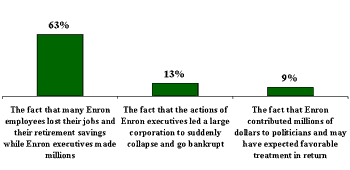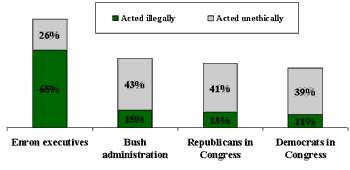GALLUP NEWS SERVICE
PRINCETON, NJ –
1. How important is the Enron situation to the American public?
The public is not paying particularly close attention to news about Enron-- only 23% are following the saga "very closely" and another 47% "somewhat closely." These are higher numbers than we found in January, but nowhere near peak news interest stories of the last decade such as the death of Princess Diana, the disputed election of 2000, or even the controversy over Elian Gonzalez.
At the same time, a slight majority of Americans believe that the Enron situation is very important to the nation. The latest CNN/USA Today/║┌┴¤═° poll, conducted Feb. 8-10, finds that roughly half of all Americans (52%) say the Enron situation is a very important issue to the nation, with an additional 37% saying the issue is somewhat important. Only 8% do not view the Enron situation as notable.
║┌┴¤═° has also measured the importance of two past scandals, the Whitewater investigation in 1994-95 and the Clinton pardons after he left office in 2001. Neither was as important to the public as the current situation surrounding Enron.
2. Which groups of Americans are most likely to view the Enron situation as important?
Liberals and Democrats are significantly more likely to view the Enron situation as very important to the nation than are conservatives and Republicans. The Feb. 8-10 poll shows that 60% of Democrats and 61% of liberals say the Enron situation is "very important," compared to 45% of Republicans and 48% of conservatives. (Fifty percent of independents and 52% of moderates feel Enron is a highly important issue facing the country.)
Older Americans, particularly those 65 years of age and older, are more concerned about Enron than younger Americans. In fact, seven in 10 adults aged 65 and older say the Enron issue is very important to our country, compared to 63% of people aged 50-64, 48% of 30-49 year-olds, and only one-third of 18-29 year-olds.
3. The Enron situation seems to have many facets. What is it that bothers the public the most about Enron?
It's clearly the image of the "little people" getting the short end of the stick that rankles the American public.
║┌┴¤═° recently tested public attitudes about three aspects of the Enron controversy and found that the financial toll on Enron employees -- contrasted to the Enron executives who made millions -- dominates Americans' thinking on the subject. Americans are far less concerned about either the mismanagement that drove one of the nation's largest companies into bankruptcy or the potential of political corruption by elected officials that have received campaign dollars from Enron.
| Which Aspect of Enron Most Concerns Americans? |
 |
4. So, it is the Enron executives who get the most criticism and scorn from the American public?
Yes. Overwhelmingly. ║┌┴¤═° finds that a large majority (65%) of Americans believe Enron executives acted illegally in connection with the Enron demise, compared to only 15% who suspect this of the Bush administration, 13% of Republicans in Congress and 11% of Democrats in Congress. Looking at perceptions of illegal and unethical behavior combined, 91% of Americans believe Enron executives are guilty of something, compared to 58% who feel this way about the Bush administration, 54% about Republicans in Congress, and 50% about Democrats in Congress.
| Perceptions of Wrongdoing |
 |
5. Most Enron top executives have pled the "Fifth" when asked to testify before Congress. Has all of this hurt the image of business and business executives in the eyes of the public?
To some degree, the image of business executives was none too positive to begin with. In ║┌┴¤═°'s "Honesty and Ethics" polls conducted over the last two decades, the percentage of Americans rating business executives' honesty as "very high" or "high" has been well below the average for all professions tested. At the highest points, 25% percent of Americans gave business executives very high or high ratings - in 1990 and again in 2000. In comparison, 90% of the public gave very high or high honesty ratings to firefighters, 68% to pharmacists , and 60% to engineers last fall.
When ║┌┴¤═° updated the ratings of several of these professions in a Feb. 8-10 poll, we found that business executives have fallen to a point where just 16% of Americans rate their honesty and ethics very high or high.
From a broader perspective, Americans' confidence in big business as an institution has also been relatively low for years. Last spring, when ║┌┴¤═° last updated these measures, the percent of Americans saying they had a great deal or quite a lot of confidence in big business was 28%. Sixty-six percent said they had a high level of confidence in the military, 50% in the Supreme Court, and 44% in banks. (In recent years, HMO's have come in at the bottom of this confidence list; last year only 15% had a great deal or quite a lot of confidence in HMOs).
6. Do Americans feel the same type of activities have occurred in other American businesses?
Yes, to some degree, it appears as if Americans perceive that these same types of irregularities indeed occur in businesses outside of Enron. About half (52%)of Americans say that the practices of Enron executives are no worse that what other business executives have done in the past, while 42% say they are worse.
Additionally, a quarter of Americans say that similar practices occur at most other large corporations, and another half say that they occur at some other large corporations. Only 19% are willing to say that the types of events that happened at Enron occur at only a few or no other large corporations.
7. Is Enron having a ripple effect on the public's perception of the economy more generally?
That could very well be the case. Several news reports have noted that the main effect of the Enron scandal may be to lower investor confidence in the information they have about companies' performances, which in turn affects their confidence in the stock market.
Indeed, a ║┌┴¤═° poll this month shows that more Americans say economic conditions are getting worse than say they are getting better -- a marked worsening of attitudes from last month. While the public's expectations of economic growth and unemployment changed little from last month, expectations were much less positive about the stock market. These less positive attitudes about the stock market appear to be a major reason why people are also less positive in their expectations about the economy overall.8. What about the Bush administration? Both President Bush and his father had close ties to Enron, and many of Bush's associates and members of the Bush cabinet have benefited from association with Enron in the past. Is this hurting Bush?
No, it doesn't appear as if the Enron situation has had a significantly negative impact on President Bush - so far. His approval rating has held steadily in the 82-84% range since the Enron controversy picked up steam in January.
Only about one in six Americans believe that Bush or members of his administration did something illegal in the Enron case, but about four in 10 believe they did something unethical but not illegal. And, while 80% say that Enron expected special treatment from the Bush administration in exchange for campaign contributions, only 29% say they believe that Bush felt he owed Enron executives special treatment.
9. Of course, Enron also made contributions to many other politicians of all political persuasions. What about the image of Democrats?
The Democrats are faring about the same in the eyes of the public as members of the Bush administration and Republicans in Congress. Only 11% say that Democrats in Congress did something illegal in their involvement with Enron, and 39% believe they did something unethical but not illegal. By comparison, 13% of Americans feel Republicans in Congress did something illegal and 41% believe they did something unethical. As shown above, all three groups are seen as far less likely to have committed illegal acts than Enron executives.
10. Has this Enron situation fueled a strong public groundswell of support for campaign finance reform?
There has been a modest increase in support for campaign finance legislation since Enron began to dominate the news, but support for such new laws has always been relatively high. Support for passing new campaign finance laws is now at 72% -- as compared to 65% in July 2001 when the question was last asked.
Support for imposing limits on "soft money" (contributions made to the national political parties) is also high at 69%, but this number is actually down a little from March 2001 (76%). Even if campaign finance legislation is enacted, two-thirds of the public believes that special interests will always find a way to maintain their power in Washington.
However, Americans are willing to see Congress investigate the nature of the relationship members of the Bush administration had with Enron executives. Eighty-two percent of Americans believe such an investigation should occur, while just 14%do not. Even a majority of Republicans (62%) support the idea of a congressional investigation of a possible Bush-Enron connection.
11. You said that the public is most upset about the fact that the "little guys" - the employees of Enron - lost their jobs and retirement while the fat cats at the top made millions. Does the public support the idea of the government coming to the aid of the Enron employees who lost out in the collapse of Enron?
It doesn't appear that this type of government aid program is a particularly popular alternative. A recent Los Angeles Times poll asked Americans if they favored government action to help Enron employees who had lost their jobs or their retirement financially and found, perhaps surprisingly, that a plurality (48%) of Americans said no", while just 38% said yes. Republicans were particularly against the concept of this type of government intervention.
At the same time, a January Time/CNN poll found that Americans -- by a 50% to 27% margin -- said that the government had not done enough for the employees and investors who had lost their savings when Enron declared bankruptcy. The rest said they didn't know enough about the event to have an opinion.
12. Finally, is there any evidence that this situation is affecting American workers' confidence in their own companies or their own financial situation?
║┌┴¤═° found little change in American workers' expressed confidence in the company at which they work in our February 4-6 update on worker attitudes. Workers' ratings of their companies' financial situations have remained roughly constant over the last three months, with about two-thirds of Americans saying the situations are excellent or good. There has also been no change in the direction in which workers say their company is going - the majority say the financial prospects of their companies are getting better rather than worse.
A New York Times/CBS poll recently asked workers who have 401(k) savings if they had lost confidence in the portion of their retirement funds invested in company stock. Just 5% said they were worried about having too much company stock in their retirement funds. A majority were not worried at all.
